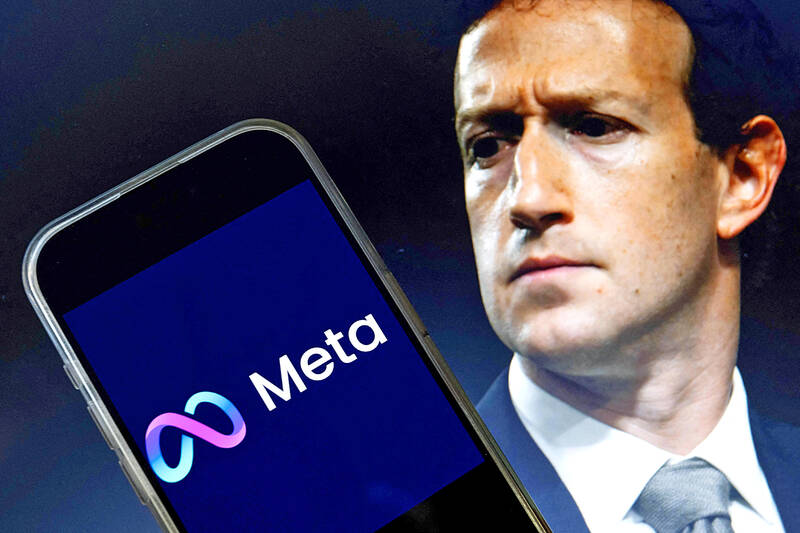Meta chief executive officer Mark Zuckerberg on Friday said the tech giant plans to invest at least US$60 billion in artificial intelligence (AI) this year, aiming to lead in the technology.
“This will be a defining year for AI,” Zuckerberg wrote on Facebook.
Zuckerberg expects Meta AI to be the top digital assistant, used by more than a billion people, and for the tech firm’s Llama 4 to be at the forefront of AI models, he wrote.

Photo: AFP
Meta is creating an AI “engineer” to contribute computer coding to its research and development efforts, he added.
Meta would construct a massive new datacenter to power its AI ambitions and is planning US$60 billion to US$65 billion in capital expenditures this year related to the technology, Zuckerberg said.
“This is a massive effort, and over the coming years it will drive our core products and business, unlock historic innovation and extend American technology leadership,” he said.
The announcement comes just days after US President Donald Trump announced a major investment to build infrastructure for AI led by Japanese giant Softbank and ChatGPT maker OpenAI.
Trump said the venture, called Stargate, “will invest US$500 billion, at least, in AI infrastructure in the United States.”
However, in a post on his social media platform X, Trump ally and tech tycoon Elon Musk said the main investors “don’t actually have the money.”
The comment marked a rare instance of a split between the world’s richest man and Trump, with Musk playing a key role in the newly installed administration after spending US$270 million on the election campaign.
Meanwhile, Microsoft president Brad Smith has gone on record saying the company was on pace this fiscal year to invest about US$80 billion to build out AI datacenters, train AI models and deploy cloud-based applications around the world.
“The United States is poised to stand at the forefront of this new technology wave, especially if it doubles down on its strengths and effectively partners internationally,” Smith wrote online.

South Korea’s equity benchmark yesterday crossed a new milestone just a month after surpassing the once-unthinkable 5,000 mark as surging global memory demand powers the country’s biggest chipmakers. The KOSPI advanced as much as 2.6 percent to a record 6,123, with Samsung Electronics Co and SK Hynix Inc each gaining more than 2 percent. With the benchmark now up 45 percent this year, South Korea’s stock market capitalization has also moved past France’s, following last month’s overtaking of Germany’s. Long overlooked by foreign funds, despite being undervalued, South Korean stocks have now emerged as clear winners in the global market. The so-called “artificial intelligence

NEW IDENTITY: Known for its software, India has expanded into hardware, with its semiconductor industry growing from US$38bn in 2023 to US$45bn to US$50bn India on Saturday inaugurated its first semiconductor assembly and test facility, a milestone in the government’s push to reduce dependence on foreign chipmakers and stake a claim in a sector dominated by China. Indian Prime Minister Narendra Modi opened US firm Micron Technology Inc’s semiconductor assembly, test and packaging unit in his home state of Gujarat, hailing the “dawn of a new era” for India’s technology ambitions. “When young Indians look back in the future, they will see this decade as the turning point in our tech future,” Modi told the event, which was broadcast on his YouTube channel. The plant would convert

‘SEISMIC SHIFT’: The researcher forecast there would be about 1.1 billion mobile shipments this year, down from 1.26 billion the prior year and erasing years of gains The global smartphone market is expected to contract 12.9 percent this year due to the unprecedented memorychip shortage, marking “a crisis like no other,” researcher International Data Corp (IDC) said. The new forecast, a dramatic revision down from earlier estimates, gives the latest accounting of the ongoing memory crunch that is affecting every corner of the electronics industry. The demand for advanced memory to power artificial intelligence (AI) tasks has drained global supply until well into next year and jeopardizes the business model of many smartphone makers. IDC forecast about 1.1 billion mobile shipments this year, down from 1.26 billion the prior

People stand in a Pokemon store in Tokyo on Thursday. One of the world highest-grossing franchises is celebrated its 30th anniversary yesterday.